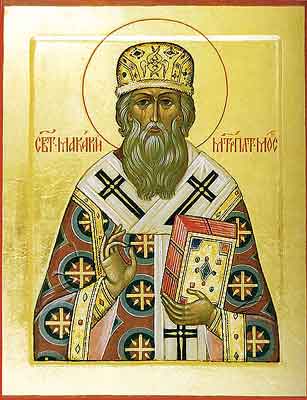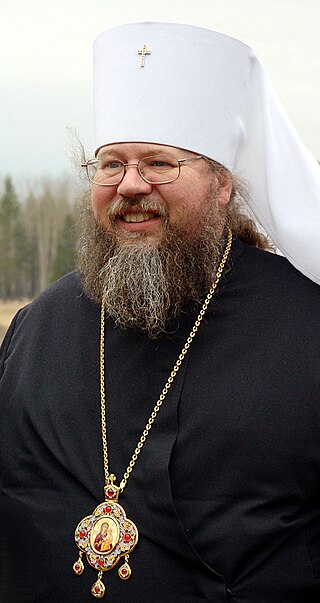
Tikhon of Moscow, born Vasily Ivanovich Bellavin, was a bishop of the Russian Orthodox Church (ROC). On 5 November 1917 (OS) he was selected the 11th Patriarch of Moscow and All Russia, after a period of about 200 years of the Synodal rule in the ROC. He was canonised as a confessor by the ROC in 1989.

Job, also known as Job of Moscow, was the first Patriarch of Moscow and All Russia. He is venerated as a saint by the Russian Orthodox Church. He was the Metropolitan of Moscow and all Rus' from 1587 to 1589. He was the seventeenth Metropolitan in Moscow to be appointed without the approval of the Ecumenical Patriarch of Constantinople as had been the norm. In 1589, Jeremias II, the Patriarch of Constantinople, regularized Job's canonical status and raised him to the status of patriarch.

Sep. 1 - Eastern Orthodox liturgical calendar - Sep. 3

September 24 - Eastern Orthodox liturgical calendar - September 26

June 22 - Eastern Orthodox Church calendar - June 24

July 22 - Eastern Orthodox Church calendar - July 24

Saint Philip II of Moscow was the Metropolitan of Moscow and all Rus' from 1566 to 1568. He was the thirteenth Metropolitan of Moscow to be appointed without the approval of the Ecumenical Patriarch of Constantinople as had been the norm.

Hermogenes, or Germogen was the Patriarch of Moscow and all Russia from 1606. It was he who inspired the popular uprising that put an end to the Time of Troubles. Hermogenes was glorified by the Russian Orthodox Church in 1913.

Macarius was the Metropolitan of Moscow and all Rus' from 1542 until 1563. He was the tenth metropolitan in Moscow to be appointed without the approval of the Ecumenical Patriarch of Constantinople as had been the norm.

November 6 - Eastern Orthodox liturgical calendar - November 8
Athanasius was the Metropolitan of Moscow and all Rus' from March 1564 to May 1566. He was the eleventh metropolitan in Moscow to be appointed without the approval of the Ecumenical Patriarch of Constantinople as had been the norm.

Jonah of Moscow was Metropolitan of Kiev and all Rus' from 1448 until his death in 1461.

Metropolitan Herman was the primate of the Orthodox Church in America (OCA). As the head of the OCA, he was the Archbishop of Washington and New York, and Metropolitan of All America and Canada. He was elected Metropolitan on 22 July 2002, replacing Metropolitan Theodosius (Lazor), who retired due to health problems related to a series of strokes.

Macarius of the Yellow Water Lake and the Unzha, the Miracle Worker was a Russian Orthodox monk and saint. He is credited with the founding of four monasteries in the Middle and Upper Volga regions of Russia.

Metropolitan Jonah is a retired American Eastern Orthodox bishop who served as the primate of the Orthodox Church in America (OCA) with the title The Most Blessed Archbishop of Washington, Metropolitan of All America and Canada from his election on November 12, 2008, until his resignation on July 7, 2012. Metropolitan Jonah was the first convert to the Orthodox faith to have been elected as the primate of the OCA.

August 23 - Eastern Orthodox liturgical calendar - August 25

November 5 - Eastern Orthodox liturgical calendar - November 7

Metropolitan Tikhon is an Eastern Orthodox bishop and the Primate of the Orthodox Church in America, holding the rank of Metropolitan of All America and Canada. Previously, he was the ruling bishop of Philadelphia and Eastern Pennsylvania. He was elected as Metropolitan of the Orthodox Church in America on November 13, 2012 at the 17th All-American Council in Parma, Ohio.









